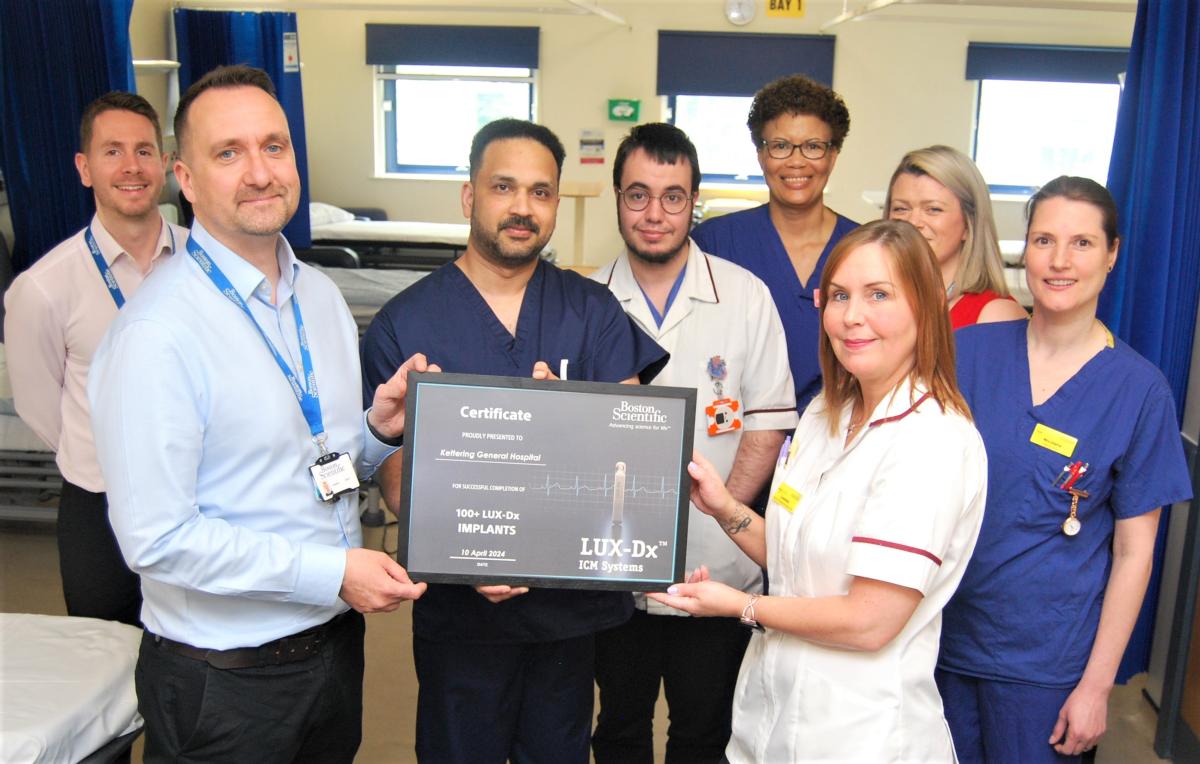KGH first hospital in Europe to fit 100 special cardiac devices

Kettering General Hospital has become the first hospital in Europe to fit 100 of a new type of recording device to measure heart rhythm for up to three years.
The device – called an implantation loop recorder - is an inch (2.5cm) long and is fitted just under the skin of a patient’s chest and used to diagnose infrequent heart rhythm disturbances like atrial fibrillation (unusually irregular/fast heart rate).
Because such disturbances can occur infrequently it can be difficult to determine what type of heart issue is causing the problem, which is where the recording device comes in.
KGH’s Cardiac Investigations Manager, and Principal Cardiac Physiologist, Leanne Kelly said: “We were one of the first hospitals in the country to implant this new type of monitor back on 31st March 2023 and now we have become the first hospital in Europe to fit 100 of them by the end of 2023.
“This loop recorder newly manufactured by Boston Scientific and is called a LUX device. It is for patients with cardiac symptoms like palpitations, dizziness, and passing out that could potentially lead to serious arrhythmias or stroke.
“These can be difficult to diagnose if the arrhythmia occurs infrequently but that is where the Lux implantable loop recorder comes in.
“After being fitted it can record heart rhythm for up to three years and sends an alert to the hospital if there is an issue so that appropriate medical intervention can be taken at the time of the incident.”
All abnormal heart rhythms are automatically sent via a home monitor that the patient can carry around with them, the patient can record their symptoms which is then sent to the hospital to assess. The hospital’s Cardiac Investigations Department monitors these alerts throughout the day and patients can call the department if they have any concerns.
It also has a 24/7 on call system so if a patient is unwell and comes to accident and emergency department they are assessed by the Cardiac Physiologist.
Patient says his life was saved when recorder showed his heart was stopping
David Tucker, 57, from Winwick near Northampton, had an implantable loop recorder fitted in November last year.
Monitoring with the recorder led to him having a pacemaker fitted four weeks ago when it was discovered his heart was sometimes stopping for 12-13 seconds each night.
The father-of-four said: “I had the loop recorder fitted because sometimes my heart was going at 200 beats-per-minute for no apparent reason, but it would only happen irregularly and if I went to hospital for an ECG it would have stopped and be back to normal.
“But the loop recorder means you are being monitored day and night and if they find something happening they can ring you and check how you are.
“For me it is no exaggeration to say it could well have saved my life. Now I have the pacemaker I have peace of mind. I also feel ten times better, and I will be able to start cycling again which is one of my hobbies. “
Leanne said: “When we download from the loop recorder we can look at the pattern of heart rate over long periods of time which is beneficial because it produces heart rate trends over long periods, we can identify when patients are active and if their heart rate increases appropriately during exercise.
“These devices have identified when a patient’s heart rate is too slow or has stopped for a period of time which has resulted in the patients having a pacemaker implanted.
“Sometimes the patients are unaware when this happens so these monitors have prevented serious consequences.”
On April 12 the hospital was presented with a certificate by Boston Scientific to mark its achievement in enabling 100 patients to benefit from the technology. The hospital has now fitted 178 of the devices.
Jon Holton from Boston Scientific presents Principal Cardiac Physiologist Leanne Kelly, and the cardiac team, with a certificate to mark the achievement.
